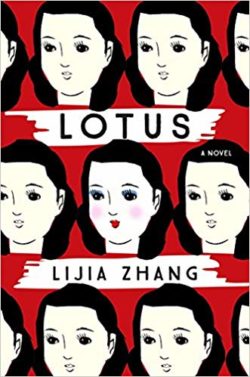Lotus, by Lijia Zhang
Henry Holt & Co, 2019
Publisher's blurb
Named one of the best books of 2017 by NPR's Book Concierge.
Inspired by the secret life of the author’s grandmother, Lotus follows a young woman torn between past traditions and modern  desires—as she carves out a life for herself in China’s “City of Sins.”
desires—as she carves out a life for herself in China’s “City of Sins.”
“Standing outside the Moonflower Massage Parlor with three other girls, Lotus flashed her red smile at every passing man. She leaned against the glass front of the parlor, one leg bent like a crane's. Luring in the clients with sweet and oily words consumed a surprising amount of energy"
Reserved, at times defiant, Lotus is different from the other streetwalkers. Her striking eyes glow under Shenzhen’s neon lights, capturing the attention of Funny Eye, Family Treasure, and a slew of other demanding clients determined to make Lotus their property. Choosing between wealthy, powerful, and dangerous men is no easy feat, but it is a surprising offer from Binbing, a soft-spoken and humble photojournalist, that presents the biggest challenge. Is Lotus willing to fall in love? Is she capable of it?
Inspired by the deathbed revelation that the author’s grandmother had been sold to a brothel in her youth,Lotus offers compelling insight into China’s bustling underground world and reveals the surprising strength found in those confronted with impossible choices. Written with compassion and vivid prose, and packed with characters you won’t soon forget, Lijia Zhang's Lotus examines what it means to be an individual in a society that praises restraint in and obedience from its women.
Reading Chinese Network Reviews
Reviewed by Kate Costello, 22/2/20
 Lijia Zhang’s debut novel Lotus demonstrates the similarities between translation and second language writing. Accustomed to reading works in translation for the book review network, I found myself scanning the beautifully designed cover and back flap for information about the translator. Just as I was about to start grumbling to myself about the lack of representation for translators, I discovered that Lotus was originally written in English.
Lijia Zhang’s debut novel Lotus demonstrates the similarities between translation and second language writing. Accustomed to reading works in translation for the book review network, I found myself scanning the beautifully designed cover and back flap for information about the translator. Just as I was about to start grumbling to myself about the lack of representation for translators, I discovered that Lotus was originally written in English.
Lijia Zhang joins the ranks of Chinese authors who write in English, but with a difference. Unlike her contemporaries Ha Jin and Guo Xiaolu, who live in the Anglophone world (Boston and London, respectively), Zhang resides in Beijing, and is thus a step removed from the English of everyday life. Compared to Ha Jin and Guo Xiaolu, her word choice sometimes does more to hinder her storytelling than enhance it, and yet her success speaks to a growing hunger for Chinese voices on the international market.
Lotus raises interesting questions about second-language writing that mirror many of the concerns of translation. Zhang speaks of the freedom of writing in a second language: freedom from linguistic convention and political constraint alike. Reading as a translator, the question of unorthodox language and audience rise to the fore. Zhang juggles this newfound freedom with the desire to speak to a certain audience and sometimes these two concerns collapse into each other. The novel is peppered with copious quotation marks and unidiomatic phrases that are just a bit awkward. And yet unlike the off-kilter English employed by Guo Xiaolu, the reader is left with a sense that this might not entirely be on purpose.
The struggle of rendering migrant characters living in Shenzhen in an English that is a second language is reflected from page to page. Lotus is written in placeless English, predominantly American usage with a smattering of British idiom and unidiomatic and archaic word choice. With many choices such as “five fragrant spices” (25) for the more common five-spice and a handful of painful new idioms for intercourse, one wonders if a bit more editorial intervention might have done the book good. The author seems determined that the reader should not forget that the novel is set in China, but at the same time the jarring language is a constant reminder of the chasm between the words on the page and the words that would be spoken by the characters in the real world.
At its core, Lotus can be read as a reckoning with family history: the author coming to terms with her grandmother’s experience as a flower girl, recast in a contemporary setting. In the process of writing the novel, Zhang conducted research on the sex industry in China and spent time volunteering with the NGO Tianjin Xingai Home. Zhang’s background is in journalism and nonfiction, and in many regards this sociological approach to the subject colors the narrative.
The novel captures the sense of desperation and entrapment felt by the young migrants she takes up as her subject, and yet there is a certain lack of emotional nuance that makes many of the characters fall flat. Zhang takes pains to expose and explain the psychology of her protagonists, at times to a fault. When Lotus tells her life story to Bing and finally revises it to tell him the truth, the narrative belabors the fact that she is doing this because of the trauma she suffered. This is of course consistent with narratives of trauma, but pointing this out undermines the naturalness of this characterization. Bing’s character also veers towards the over-planned, as in the last thirty pages of the novel the 1989 Tiananmen protests are raised as a final justification for his marital discontent. The characters feel too neat, and there is a sense that they are compelled forward for the sake of the narrative rather than because that is how they would act under the circumstances.
Perhaps the most problematic aspect of the novel is the portrayal of Lotus as an exceptional case and therefore undeserving of her profession. The novel is a story of one woman’s redemption, not through men or domestic security but through religion and personal edification. The ending of the novel suggests that there may be hope for Lotus and her brother (whether we readers believe in this possibility or not is another question), but there is no doubt that her coworkers will remain in the industry. Lotus may have been cleansed of the shame and guilt (as foreshadowed by the very choice of the name Lotus), but her friends will continue to be looked down on and treated badly. Despite Lijia Zhang’s meticulous research, Lotus remains a formulaic story of poverty, sexual awakening, love, guilt, friendship, education and finally redemption. The moralistic underpinnings of the story left the characters unlikeable, even though I felt like I was supposed to like them. The resolution of the story is both unsatisfying and lacking in compassion, focusing on Lotus as the exception, beautiful and clever despite her occupation, as if we would expect her to be the opposite.
The most interesting character in the novel is Bing, the photographer who falls in love with and tries to marry Lotus. Bing is fascinated with Lotus and her story. Or perhaps more accurately, he is fascinated with what he can offer her, how he can make her feel, how he can rescue her from her current position, and how she can in turn make him feel “the power and pleasure of being a real man” (41) . In the wake of the dissolution of his own marriage, he seems to draw comfort from the good he can do for others, though throughout the course of the novel the distinction between how he can help others and how he can help himself becomes more fraught. Bing is not so different than the author herself, and perhaps his positioning no less unproblematic. Both in Bing’s photography work and in the writing of the novel itself, there is precarious balance between exposure for a sense of social good and voyeurism, one that remains unresolved with the conclusion of the novel. Lijia Zhang can exalt Lotus and absolve her from perceived wrongdoings, but like Bing, she cannot rescue Lotus from her plight. The ending only serves to remind the reader that while the protagonist may find a way out, the same cannot be said of her friends or the thousands of real women in similar circumstances. With Lotus, perhaps exposure is the closest we can come to true empathy.
Reviewed by Kate Costello
Reviewed by Amy Matthewson, 10/2/20
 Lotus is named after Lijia Zhang’s protagonist and follows her trials and tribulations as a working girl in the bustling city of Shenzhen. Many of the themes have been the focus of other works, such as gender and social inequalities as well as the challenges of modern life in China, yet Zhang manages to inject a refreshing perspective through her flawed but likeable characters.
Lotus is named after Lijia Zhang’s protagonist and follows her trials and tribulations as a working girl in the bustling city of Shenzhen. Many of the themes have been the focus of other works, such as gender and social inequalities as well as the challenges of modern life in China, yet Zhang manages to inject a refreshing perspective through her flawed but likeable characters.
Despite the difficult topic, I found that Zhang tackled these current issues with sensitivity and humour. The friendship, conversations, and desires of Lotus and her colleagues delve into universal emotions of love, acceptance, and dignity. Mimi, for example, accepts the atrocious behaviour of her boyfriend with the false hope that he loves and accepts her; Little Jade turns to Xia for the comfort and support of a mother figure, and Lotus longs for dignity and respect.
While there are undoubtedly some clichés, the novel offers readers a nuanced understanding of societal stratifications and varying power dynamics in modern China. What I especially enjoyed was the exploration of these contemporary issues through the complexities of the female characters and their varied relationships.
Zhang does not simplify her characters; instead, she portrays each character as complicated beings faced with difficult lifestyle choices and conflicting emotional needs and desires. The development and evolution of Lotus as a person was both surprising and a welcome change to the usual character trope of beautiful, frail, and subservient Chinese women.
Underlying the relationships between the characters are deeper issues on the use and exploitation of women as commodity - whether for sexual pleasure, as entertainment, or as a bribe to seal a business deal. This highlights the burden placed on women during an era of heightened social tension as China struggles with rapid social and economic transformation and growth.
In many ways, Lijia Zhang’s main character Lotus brought to mind Henrik Ibsen’s Nora in A Doll’s House. Both works explore modern problems through their main character; we are introduced to Lotus and Nora as women in need of discovering themselves amidst the pressures of societal norms and expectations. In both cases, Lotus and Nora challenge these acceptations through their rebellious natures, courage, and independence.
I would recommend Lijia Zhang’s Lotus. One of my favourite aspects was the use of Chinese words and expressions in the chapter titles as well as throughout the novel. With unexpected twists and turns, Lotus asks readers to approach the issues of prostitution with understanding and consideration and is as much about China as it is about modern social inequalities and injustices.
Reviewed by Amy Matthewson
Reviewed by Rebecca Ehrenwirth, 15/1/20
 Lijia Zhang’s debut novel Lotus leaves the audience wanting to read more. Inspired by her grandmother’s life, the author created such a captivating fusion of reality and fiction set in the ever-changing city of Shenzhen that the reader is hoping for another novel to come soon. By shifting between the perspectives of Lotus, the story’s protagonist and Ji or prostitute who works in the local sex industry, and Bing, a passionate photographer, the reader follows their intertwining lives.
Lijia Zhang’s debut novel Lotus leaves the audience wanting to read more. Inspired by her grandmother’s life, the author created such a captivating fusion of reality and fiction set in the ever-changing city of Shenzhen that the reader is hoping for another novel to come soon. By shifting between the perspectives of Lotus, the story’s protagonist and Ji or prostitute who works in the local sex industry, and Bing, a passionate photographer, the reader follows their intertwining lives.
Not only does the reader get a unique glimpse into the city of Shenzhen (“Shenzhen: Splendid China, which boasted miniature versions of China’s famous sites; Window of the World, which re-created famous sites from around the globe”), but they also gain insight into the illegal sex industry in China by closely following Lotus’ experiences with the police: “Or she would be sent to a so-called custody and detention center, a labor camp of sort, if the authorities found enough evidence against her.”
However, Lotus’ biggest fear is not being sent to prison but being send home. While she came to Shenzhen to earn money in order to pay for her brother’s education, she never revealed to her family how she is making her money. Over the course of the story the reader gets to know how Lotus became a ji through flashbacks and how other girls were given away by her families when they were only three or four years old only because they were not boys. The deep nostalgia for her home town tears Lotus apart; she misses her brother and her simple life as a child. All what keeps her going is the goal to earn enough money for her brother so that he can get a university degree.
But the reader not also learns about Lotus; we also get to know Bing who wants to research the local sex industry through his camera lens: “‘For me, prostitution is a window through which to see the changes in this country,’” he states. Bing believes that with his photos he can help people see all sides to it as “prostitution touches all those hot-button issues–migration, the income gap, corruption, sex, morals”. Bing characterizes himself as a caring and cautious man who fell in love with Lotus who wants her to being able to enjoy her life. For Lotus, Bing on the one hand represents all she ever longed for: a caring, humble man who so desperately wants to free her from her life as a ji. On the other hand, she is worried whether he can really afford a life for them both since he is a freelance photographer with no steady income.
At the same time Lotus shows many different sides of China: the constant worry about money, be it making enough money or making even more money; the discrepancies between life in the city and rural life; the glorification of the past while at the same eradicating other parts of the past. By referring back to the past, the reader gets a clearer picture of how China has changed since Mao’s times. On the other hand, when Lotus travels with Bing to her home town, the reader also gets to know how little China has changed since Mao: as is still customary today, a portrait of Mao hangs in every house and he is still seen as China’s greatest hero. The reader is taken on a journey through the life of a young Chinese woman whose destiny is not only influenced by the people she meets but also by the changes in her country.
All chapters are entitled with a carefully chosen Chinese idiom, which hints at the chapter’s content. The author not only chose to leave the Chinese characters with the idioms along with an English translation, but she also incorporates many Chinese words with a gloss briefly translating or explaining the word into her story. This makes the book an even more enjoyable read.
Reviewed by Rebecca Ehrenwirth
Reviewed by Cat Hanson, 30/7/19
 If you take a walk around almost any city in China, you’ll see similar signs everywhere. In hotels, neighborhood notice boards and on residential streets. The messages vary, but almost always have the same meaning: Oppose drugs, oppose pornography, oppose prostitution.
If you take a walk around almost any city in China, you’ll see similar signs everywhere. In hotels, neighborhood notice boards and on residential streets. The messages vary, but almost always have the same meaning: Oppose drugs, oppose pornography, oppose prostitution.
In just a few years, China has been cracking down heavily on prostitution. With the threat of the door exploding open in the midnight hours, many sex workers have retreated from the streets behind the closed doors of massage parlors and small hotels. It’s therefore been a fascinating insight to have read several novels from writers exploring the stories behind many of the country’s sex workers.
Lotus is a tale caught in the midst of these crackdowns, as sex workers make their living in Shenzhen, one of China’s fastest-growing cities. Lotus, a young woman from Sichuan province, is drawn to Shenzhen by the promise of making money, only to find that the fastest way to save funds for her family and her brother’s education is in the back rooms of the massage parlor, rather than on the factory floor. We follow her relationship with local photographer, Hu Laoshi (Teacher Hu), as he documents the lives of the sex workers in Shenzhen.
As a newcomer to Shenzhen myself, it was really coincidental timing to have this novel landing in my inbox. Trying to match up the images conjured in the book with the city in front of me offered a new perspective on the storyline.
I also personally found the injection of real Chinese words (ta ma de) or literal translations (“- they were Mandarin ducks for one night,”) to be unique, although sometimes I felt the need to pick up my dictionary to see what the meaning was. However, learning new phrases can never be a bad thing.
I was fascinated by the theme of class that cropped up throughout the novel. On the surface, there is the more obvious disparity between rich and poor. Lotus dreams of returning to her rural village home dressed in splendid clothes and having funded her brother’s education at one of the best universities in the province. Sex workers are often looked down upon as ji, a slang term for prostitues often spoken in disdain by the book’s characters. However, even within the sex industry, we are led through the struggle of attaining certain ‘levels’ from ‘street women’ to KTV attendants all the way ‘up’ to high-class prostitutes in expensive hotel bars. As Zhang’s contextual inclusion midway through the novel explains, “Ernai, the second wife, the modern version of a concubine, sits at the top of the prostitution hierarchy.” This is also reflected in some of the character’s idolization of the life of an ernai as the ultimate goal.
A surprising twist in the story was Lotus’ admission that she had in fact lied about why she entered sex work. Although she is overcome with guilt, it suggests that preconceptions of tragic circumstances behind sex workers can sometimes be a stereotype, and that there is also an economic motivation that can be persuasive for young women looking to save money in the city. Overall, the novel was again an excellent window into the dynamics of characters found in a large city in China. It also feels important to document these windows of time, particularly in an arena as ever-changing as China.
Reviewed by Cat Hanson
Reviewed by Kevin McGeary, 17/7/19
 When discussing his novel The Remains of the Day, Kazuo Ishiguro explained that most of us are butlers, in the sense that we spend our lives serving something much bigger than ourselves. What Ishiguro said about is surely even truer of another job - prostitution.
When discussing his novel The Remains of the Day, Kazuo Ishiguro explained that most of us are butlers, in the sense that we spend our lives serving something much bigger than ourselves. What Ishiguro said about is surely even truer of another job - prostitution.
So much literature has been written about what is commonly said to be the world’s oldest profession - is it really a profession? And surely hunting and gathering both predated it – that the issue is difficult to tackle in an original manner. The eponymous prostitute of Zhang Lijia’s first novel is neither a high-class call girl striking out on her own nor a put-upon peasant who is trampled on by men. She is fully realized and faces highly relatable challenges.
In Lotus, the titular central character resorts to prostitution after the unfairness and destitution of factory life become too much. While following her story, in which a nonsexual relationship with a male photo-journalist offers her a chance at salvation, readers can take in much about Chinese culture. Following the superstition of naming one’s children
after what they are hoped to achieve, the titular character is named after “a flower that grows in the mud yet remains pure and unstained”.
The novel humanizes both the prostitutes and their clients: “one middle-aged architect didn’t want sex, but to complain about his terrible wife.” Lotus is given a 'pet-the-dog moment' early on when it emerges that – like most of her colleagues – she sends money back to her struggling family in the countryside.
The chapter of each title is a Chinese proverb and folk wisdom is sprinkled throughout to help the reader make sense of the characters’ experience: “a fresh flower withers away on cowpat”, “if you stay long enough in a fish market you soon get used to the stink”.
As well as making the characters likeable, it puts them through recognisable hell. One reflects that “poverty stifles dignity” and social issues are unobtrusively brought to the fore. Discussing his exam pressure, Lotus’ brother confides to the photo-journalist: “If I fail…my sister will probably kill herself.”
After creating these characters, the novel harnesses the brutal side of life in China to challenge them: “Since Little Red had died young and unmarried, no funeral rites were performed for her.” This leads to a climax in which Lotus considers that “only marriage could ease the stain of her past and secure her future financially.”
Lotus refrains from any simplistic take on the issues it covers. Instead it is a life-affirming love story full of cliched characters and situations, it portrays the seamy side of Chinese society in ways that are both respectful and real.
Reviewed by Kevin McGeary
Reviewed by Zahra Raja, 30/4/19
 Lotus is a novel about a young prostitute living in Shenzhen trying to earn a living to support her family and send her young brother to university. It is a well-trodden path she walks, the same path of many rural migrants who come to the city seeking employment and a better life but ultimately resorting to selling their bodies in order to make a living. The exploration of the sex industry in contemporary China in the novel, riddled with corruption and disposed to wealthy and poor clients alike is a fascinating topic against the backdrop of a China attempting to eradicate corruption from the country. Half-hearted attempts to raid brothels and arrest prostitutes fail to make an impact; the industry continues to bounce back and exist as part of the very fabric of Chinese society.
Lotus is a novel about a young prostitute living in Shenzhen trying to earn a living to support her family and send her young brother to university. It is a well-trodden path she walks, the same path of many rural migrants who come to the city seeking employment and a better life but ultimately resorting to selling their bodies in order to make a living. The exploration of the sex industry in contemporary China in the novel, riddled with corruption and disposed to wealthy and poor clients alike is a fascinating topic against the backdrop of a China attempting to eradicate corruption from the country. Half-hearted attempts to raid brothels and arrest prostitutes fail to make an impact; the industry continues to bounce back and exist as part of the very fabric of Chinese society.
Lotus and her co-workers, amidst the drudgery of trying to attract clients, befriend a failed businessman turned photographer named Bing who is slowly gaining recognition for his efforts to shine a light the industry. He often bails them out of jail whenever the police conduct raids on local brothels and pays their debts, and in return they grow comfortable enough with him allow him to take photographs and conduct interviews. The novel follows Bing’s attempts to make a name for himself as a photographer in order to be able to support his daughter and prove himself to his ex-wife whilst also trying to woo Lotus.
As the other main character, Lotus’s own struggles are also narrated; namely her attempts to hide her profession from her family, save enough to send her brother to higher education whilst dreaming of escaping prostitution and finding a better life for herself. She initially accepts Bing’s advances with the beliefs that he will be her escape, but finds that her life with him does not provide the stability and safety she was hoping for, nor can she escape her life as a prostitute as easily as she’d hoped. The novel continues along this vein, Lotus neck-deep in her internal conflict and insecurities and Bing for the most part completely oblivious and in his own way trying his best to keep both Lotus and his ex-wife and child happy.
The turning point comes when Lotus’s brother discovers how she supported her family all those years and Lotus runs off to a monastery in despair and rage after they argue. This is one of the more touching chapters; throughout the novel a recurring theme is Lotus’s desire to cleanse herself from sin of her profession, and she carries out prayers and religious rituals without ever really believing that it will be enough to purify herself. Her time at the monastery allows her to heal spiritually and mentally, and when she leaves she is determined to live well and rely on herself alone.
Thus, despite being pregnant with his child, Lotus chooses to leave Bing at the end of the novel and forge a new life for herself and her child independently as a schoolteacher. I felt no real attachment to Bing; he is irritatingly mild and serves as the perfect foil to Lotus who gains the confidence in the end to admit that she doesn’t really love him, doesn’t want to marry him and sends him packing to Beijing with the expectation that he will pay child support. Lotus’s strength of character is admirable, and the sacrifices that she makes for her family are both admirable and heart-wrenching; the expectation for an ending gone horribly wrong was high so it was a relief for the novel to end on a hopeful, optimistic note.
Lotus provides an insight into a facet of Chinese society that is not well known and shows us that it is as human as any other; it is tragic, comic and moving all at once but more than this it is optimistic; life is in constant motion, and even those migrants who undergo severe hardships to earn a living are hopeful that life can and must get better.
Reviewed by Zahra Raja
Reviewed by Markéta Glanzová, 26/4/19
 Lotus by Lijia Zhang takes place in 1990´s China and tells a story of a village girl (Lotus) who runs away from a fixed marriage and comes to Shenzhen (one of the fastest growing cities) in search of employment and better life. We follow her life as working as a prostitute (who are called “ji” in the book) and slowly learn all the reasons she became one. The second main character is a photojournalist Bing who is interested in the lives of young migrant girls and wants to document on the phenomenon of prostitution which is illegal and taboo in China. He lives together with the girls and soon starts to feel very close to Lotus.
Lotus by Lijia Zhang takes place in 1990´s China and tells a story of a village girl (Lotus) who runs away from a fixed marriage and comes to Shenzhen (one of the fastest growing cities) in search of employment and better life. We follow her life as working as a prostitute (who are called “ji” in the book) and slowly learn all the reasons she became one. The second main character is a photojournalist Bing who is interested in the lives of young migrant girls and wants to document on the phenomenon of prostitution which is illegal and taboo in China. He lives together with the girls and soon starts to feel very close to Lotus.
However, don’t expect another “Pretty Woman love story”. Even though “love” is one of the center motives of the book, things are complicated for Lotus and she has a long journey to go in front of her.
Lotus in an interesting and complex character who seems to be trapped between tradition and modernity. On one hand, she feels filial piety towards her family and the main reason why she decided to come to Shenzhen is to earn money for her younger brother to go to the university. She also wants to make her family and the whole village proud of her and maybe even a bit jealous. (No one, of course, knows how she earns the money in the city as she told everyone that she runs a successful restaurant).
On the other hand, she is “modern” in the way of thinking and longing for freedom. She likes life in the city because she can buy whatever she wants, and she has more opportunities here. She seems to be very determined, strong-minded and hardworking to achieve her goals, however, the paradox is that in spite of all her qualities, she is still perceived as an uneducated migrant girl and cannot get any other job than being a “ji”. However, the readers can question this, as Lotus herself admits that as the “ji” she can earn much more money than by working in a factory or in a restaurant and that she got used to the money. That’s why being “ji” can be partly considered to be her deliberate choice, which makes her even more fascinating character.
Lotus feels guilty sometimes and during the whole time, she doesn’t lose her Buddhist belief. Finally, it is also Buddhism and her faith which helps her to change her life and free herself. Last part of the book can be read from a feminist point of view, as Lotus finally liberates herself of all men, finds a purpose of life and a job which both fulfills her but is also beneficial for the others. I especially liked this last part of the book when Lotus started to become more aware of herself, her needs and her self-worth and realizing she has the power to change her “destiny”. I felt a bit sorry that this line appeared at the very end of the book as I think that this new development of the character would deserve more space to fully develop.
Lotus by Lijia Zhang is a chance for the reader to peek into the reality of modernizing China and the uncensored life and struggle of an estimated 10 million working girls who officially didn’t seem to even exist. What I particularly liked about the book is that Lotus is very “human” – she has lots of flaws, she is not always honest but step by step she becomes a person she can be proud of and it is an extraordinary experience for the reader to be part of her transformation from a slightly naïve village girl dependent on men into an independent young woman who has full control over her life.
Reviewed by Markéta Glanzová
Reviewed by Catherine Shipley, 25/3/19
 Lotus is the name of the young woman who is the main character of this story. The story recounts her experiences working as a prostitute in Shenzhen. Before starting to read the novel, we discover that Lotus is inspired by the life of the author’s Grandmother, who worked as a ‘flower girl’ in the 1930’s. In ‘Acknowledgements’ it is clear that Lijia Zhang carried out a lot of research into the sex industry in China and the lives of the women who work in it. Knowing this makes many of the scenes all the more poignant.
Lotus is the name of the young woman who is the main character of this story. The story recounts her experiences working as a prostitute in Shenzhen. Before starting to read the novel, we discover that Lotus is inspired by the life of the author’s Grandmother, who worked as a ‘flower girl’ in the 1930’s. In ‘Acknowledgements’ it is clear that Lijia Zhang carried out a lot of research into the sex industry in China and the lives of the women who work in it. Knowing this makes many of the scenes all the more poignant.
Considering the heavy nature of the topics raised in Lotus, I found it surprisingly gentle and easy to read. Perhaps this was due to the fact that the main characters seem so likeable and familiar that the reader is swept up in their day-to-day lives without pausing to reflect on the horrendous circumstances that they find themselves in. This is perhaps testament to the practical mindset and tenacity of the working women, which give them an ability to keep going, fighting to prosper in the dire situation they find themselves in.
The women are inspiring as, although they are in many ways striving for their own survival and that of their families, they also find the energy to attempt to thrive in the conditions they find themselves in. Xia manifested this desire for autonomy and resistance to becoming a victim by seeking pleasure from her job. Mimi is determined to pursue a romantic and family-focused life in the form of a relationship with her (rather useless) boyfriend. For Lotus, it was shown through the determination to support her brother to achieve a university place and to fund his studies.
Ironically, Lotus finds a certain level of freedom and independence in her job that she realises may not be as readily available in a conventional, married life. This adds an interesting twist to her story as the reader sees that ‘escaping’ her profession or being rescued from it may not be as simple a solution as may be assumed.
The outsider in this story is Bing, a photographer who lives in close proximity to the girls in order to develop a collection of photos about their lives, with the aim of highlighting the plight of migrants in Chinese cities. Separated from his wife and daughter, he is drawn into this world, staying longer than planned and living in conditions which are unimaginable for someone as well educated as himself. In addition to having studied at one of the best universities in China, he had also worked as a businessman prior to becoming a freelance photographer.
Bing’s role in this narrative helps to shake up assumptions about strength, power and control. In mainstream society, the working women Bing interacts with are seen as being at the bottom of the social hierarchy, whereas Bing would be towards the top, a respectable and educated man. Once the reader is exposed to the lives of each member of this unusual group, seeing their weaknesses, hopes and the ways in which they attempt to overcome problems, the indisputable hierarchy fades into irrelevance. Such a refreshing insight is achieved in an almost subtle way.
The book ends in a way which is far from being perfect and uncomplicated. Somehow this is, nonetheless, also a comfortable read. It is a natural close to Lotus’ story, in line with the ups and downs of her imperfect life, which leave us feeling strangely hopeful.
Reviewed by Catherine Shipley
Reviewed by Ruth Matanda, 21/3/19
 Lotus is a book which portrays the lives of women who are involved in China’s sex industry. The story unfolds through the viewpoint of the protagonist Lotus, a young woman who as a teenager migrates from a rural village to Shenzhen, one of China’s Special Economic Zones, along with her cousin Little Red, driven by the motivation of changing their fates. As China tries to find its identity and its place in the world so do its citizens, shown through the characters in this novel by Lijia Zhang.
Lotus is a book which portrays the lives of women who are involved in China’s sex industry. The story unfolds through the viewpoint of the protagonist Lotus, a young woman who as a teenager migrates from a rural village to Shenzhen, one of China’s Special Economic Zones, along with her cousin Little Red, driven by the motivation of changing their fates. As China tries to find its identity and its place in the world so do its citizens, shown through the characters in this novel by Lijia Zhang.
Lijia Zhang is not the first female author to explore China’s issue of prostitution and its boom during the country’s reforms and opening up period, yet despite having read novels which dealt with similar topics, the book still managed to keep me engaged. For me one of the standout aspects of the book was the way Lijia Zhang utilised the language to give the story its charm. The book is humorous without making light of the topics it is exploring and this humorous tone contrasts with the moments when it is thought provoking using wordplay and old Chinese proverbial sayings in each chapter title, reading like a mantra, offering wisdom and comfort for the characters. The novel itself manages to keep an optimistic tone from beginning to end despite the hardships they face the characters never lose their positive attitude, they come apart and together again many times (psychologically and mentally) and yet continue to search for their happiness and their salvation.
The contextualisation of the themes explored also contributed to distinguishing the book from others which have dealt with similar topics. The political and economic situation of the country are not always focused on yet Lijia Zhang manages to make them relevant throughout the novel by showing the way they link to social problems of rural poverty, corruption and lack of opportunities for migrant workers which contribute to the marginalisation of migrant women and sex workers. I found that having the context provided really allows the reader to understand the motivations behind the characters (this does not mean that you will always agree with their choices or empathise with them) in that we view them not as characters whose choices and behaviour are isolated occurrences but rather products of a corrupted system, the wealthy and powerful abuse those beneath them because they suffer little to no consequences and the powerless are left with very few options to survive within the system, with prostitution being one.
I would recommend this book to everyone as I am sure you will all be as captured by the narrative and the characters as I was, but I would especially urge those interested in the kind of impact that China's rapid development and acceptance of a western style economic market has had and continues to have on the country’s marginalised groups as the book looks into their struggles, the social stigmas against them but most importantly it gives readers a chance to understand the root cause of the problem and why it is difficult to find a solution. The characters in the novel may be fictional however the story which unfolds is that of many women living in China who are involved in the sex industry.
Lotus is a book that refuses to censor the harsh reality of sex workers, Lijia Zhang does an amazing job of presenting modern China, with all of its contrasts, a country which offers its new generation a better future, a chance to succeed in life and achieve their China dream yet one which still fails to protect the vulnerable and the disenfranchised and to provide tangible solutions for their problems.
Reviewed by Ruth Matanda
Reviewed by Tamara McCombe, 7/3/19
 In many ways the novel Lotus by Lijia Zhang is not a work of fiction. Many of the characters and their circumstances are based on the author’s personal experiences or of those she knows or has interviewed. For instance, like the protagonist Lotus, the author was forced to work for a decade in a factory instead of pursuing her promising academic path. The author also permeates herself into Bing, the photo-journalist, as both extensively interviewed prostitutes for their creative oeuvres.
In many ways the novel Lotus by Lijia Zhang is not a work of fiction. Many of the characters and their circumstances are based on the author’s personal experiences or of those she knows or has interviewed. For instance, like the protagonist Lotus, the author was forced to work for a decade in a factory instead of pursuing her promising academic path. The author also permeates herself into Bing, the photo-journalist, as both extensively interviewed prostitutes for their creative oeuvres.
Zhang and her characters are of a generation of Chinese with each foot in a different time and space. Born and raised in a China rapidly developing economically in the wake of Deng Xiaoping’s Opening Up and Reform Era which is shackled to an extent by traditional Chinese values, yet absorbing much cultural influence from outside the state boundaries - Zhang has studied and worked extensively in Europe and America as well as having been married for a time to an American journalist. This is a story exploring complex relationships in a China finding itself a new direction.
Three recurring themes are change versus continuity, face or shame and disparity or contrast.
A clear example of the first theme is the presence of prostitution in China. Additional wives and lovers are not new phenomena in China, born out of economic reform. Concubines and massage parlours have been present for centuries. Historically female sex workers may have been titled concubines, now they are euphemistically called ji (chicken), ‘working girls’, ‘willows trees on the roadside’ and ‘flowers on the wall’ and looked down upon. When viewed in the past such women are romanticised, yet in more recent times are the ill-treated victims of a system which despises them yet would not function without them. The underclass see this clearly themselves: “…migrant workers are China’s unsung heroes. Without their cheap labour, their contribution—taking over the heavy, dirty jobs in the city—there would not be China’s economic miracle.” Time with these women is used for personal pleasure and entertainment, as well as in bribery and business deals.
As prey to continuous crackdowns, the sex workers must veil their work behind the front of massage parlours. Although Lotus is building a fund through her sex work for her younger brother to go to university, an opportunity not possible without her, she lies to her family saying she is working overtime at a posh restaurant. She is not only driven by her desire to support her brother but also to be seen back in her home village as a model daughter.
The work portrays a China of rich and poor, traditions and modernity, pure and corrupt. To varying degrees Lotus’ numerous suitors flaunt their wealth and status in attempts to win her exclusive attention, suggesting she will remain perpetually in the alleys without their support. We read of the traditional rabbit warren-like hutong alleyways contrasted with expensive meals in revolving restaurants and chapters begin with weighty Chinese teachings, putting contemporary stories within an historical system, the Chinese traditionally viewing history as cyclical. We also encounter contrasting characters such as Lotus - a sacred flower in Chinese Buddhism which is pure, unstained growing from the mud – who is trying to redeem her soul whilst other characters sell out their idealism: “there wouldn’t be another 1989. China’s intellectuals and elites, who had always played the lead roles in mass movements, were now too comfortable to rock the boat. [Bing’s] old classmate Yuejin had become a high-flying official, and several of their friends had become fat bosses who were only interested in power, money, and women. Nowadays people were enjoying greater business opportunities and expanded personal freedoms, or more precisely, an expanded cage.”
I thought I would hate Lotus’ resolution being detailed out rather than letting me imagine her outcome. Usually the end being written out feels patronising but in this case it reveals a more complex picture of some of the emotions and soul searching of those embroiled in prostitution.
As a sinologist I loved how Chinglish – such as dropping the word shuaige meaning 'handsome man' into sentences – peppers the work. It anchors the text in China, making the scenes foreign but not alien.
This book is as much for those interested in seeing (yet) another interpretation of the less beautiful results of economic change as it is for those wanting to explore the psychology and general motivation behind those engaged in sex work and their moral deliberations. Lotus is symbolic of China’s growth, and how it can be rid of its sins by doing good deeds.
Reviewed by Tamara McCombe
